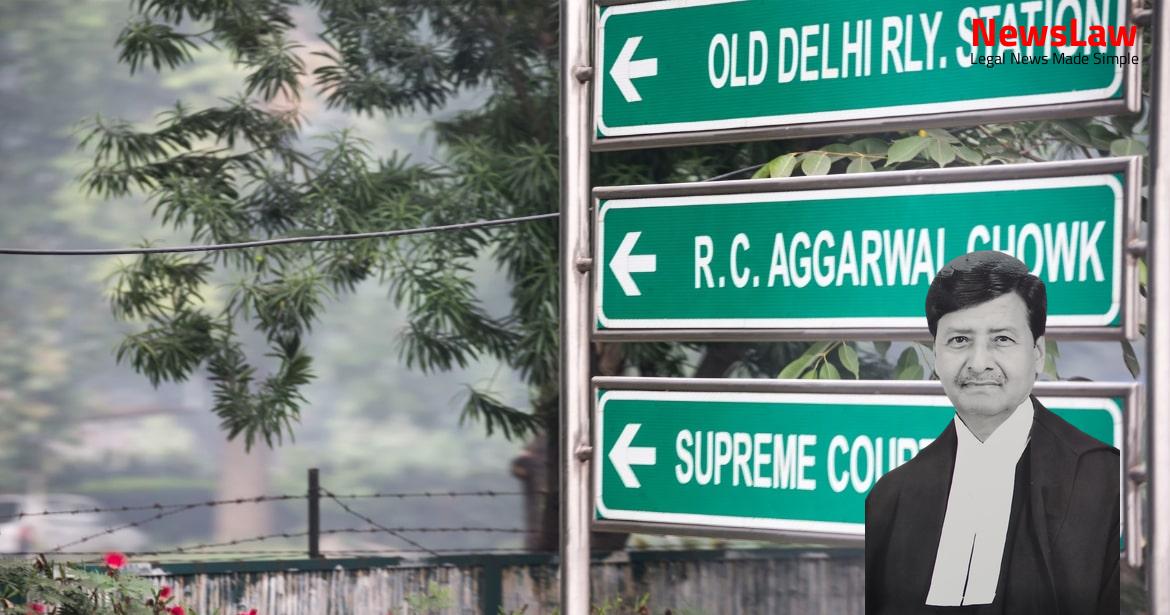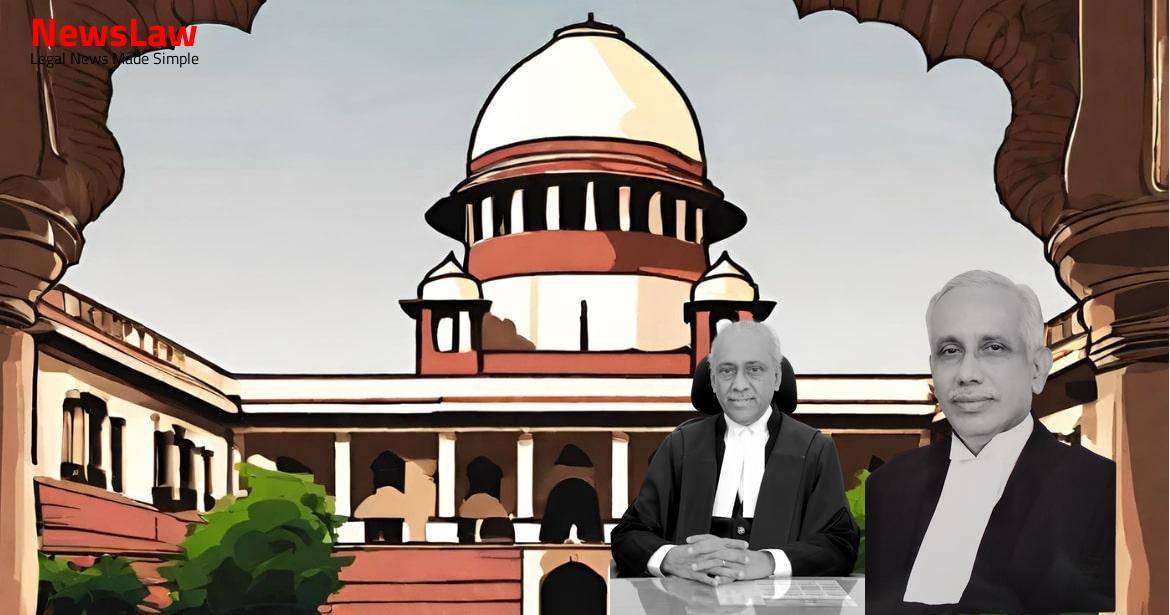In the case of the State of Maharashtra vs. the Appellant regarding MBBS course admission, a dispute has arisen over the cancellation of the appellant’s admission. The appellant, whose father serves in the Border Security Force, challenges the cancellation as arbitrary and unjust. The legal battle highlights the complexities of admission criteria and the need for fair treatment in admissions. Follow the case for more insights.
Facts
- The appellant challenged the cancellation of his admission by filing a Writ Petition before the Bombay High Court, Nagpur Bench.
- The appellant claimed entitlement to an exception under clause 4.8 of the NEET UG-2023 Information Brochure due to his father’s employment with the Government of India, even though he completed his education outside Maharashtra.
- The appellant applied for admission under the OBC/NCL category as a domicile of Maharashtra.
- The cancellation of the appellant’s admission was deemed illegal and arbitrary.
- The appellant paid the admission fees and was issued a provisional selection letter for MBBS course at a college in Maharashtra.
- The college cancelled the appellant’s admission without issuing notice or providing an opportunity for the appellant to be heard.
- The appellant approached the court to challenge the orders passed by the Bombay High Court.
- The appellant’s father is employed in the Border Security Force as a Head Constable.
- Writ Petition No 5141 of 2023 was dismissed on September 5, 2023, as appellant did not meet requirements of clauses 4.8 and 9.4.4 of the Information Brochure.
- Appellant did not select specified reservation for Children of Defence personnel (DEF) during online application, hence could not claim it later as per clause 9.4.4 of the Information Brochure.
- Misc. Civil Application (Review) No 980 of 2023 was also rejected on October 26, 2023.
- Appellant challenges the dismissal orders in the current appeals.
Also Read: Kozyflex Mattresses Pvt. Ltd. vs. SBI General Insurance Co. Case Summary
Arguments
- The appellant’s father is serving in the Border Security Force (BSF) and the appellant meets the criteria for admission in the State quota.
- The appellant was allotted a seat in the OBC/NCL category as a domicile of the State of Maharashtra and cancellation of this admission was deemed unjust and arbitrary.
- The rule requiring passing Indian School Certificate Examination from an institution located in Maharashtra State was argued not to be applicable to candidates covered by certain clauses.
- The requirement imposed by the clause regarding the parent being transferred to Maharashtra was considered arbitrary and unreasonable, with no nexus to the intended objective.
- Interpreting the rule in a manner that avoids unconstitutionality was emphasized, especially in the context of admissions based on region or residence.
- The rule was complex and required careful interpretation, with exceptions for certain categories such as Defence Personnel transferred to the Maharashtra Region under Rule B(4)(iii).
- Referring to prior judgments, it was argued that the impugned orders were legally flawed and relief should be provided to the appellant to protect their admission in the MBBS (UG) course.
- The appellant’s father was deployed outside the State of Maharashtra in connection with service of the nation.
- The respondents relied upon the proviso to Clause 4.8 while cancelling the admission granted to the appellant in CAP1.
- The appellant is qualified to seek admission in the State Domicile (OBC/NCL) category as per clause 4.8 of the Information Brochure.
- The appellant also stands in merit for the admission.
Also Read: Rajeev Savara v. State of Maharashtra & Ors.
Analysis
- The judgment highlights the challenges in providing restitution due to the time gap between illegal actions and court decisions.
- Exceptional circumstances are required for relief in rare cases related to the place of posting.
- The conditions imposed on candidates, like the impossibility of fulfilling parent transfer requirements, can be unfair.
- The complexity of identifying and applying remedial measures in constitutional courts is acknowledged.
- Unreasonable conditions like requiring parents to be transferred back to a specific state for admission can create obstacles.
- The delays in the legal process, from filing a writ petition to delivering judgment, contribute to challenges in providing timely relief.
- The distinction between different categories of employees for admission eligibility is deemed arbitrary and lacking purpose.
- The appellant’s case highlights the discrimination faced due to guidelines not aligning with the intent of the rules.
- The judgment emphasizes the importance of fairness in admissions, especially for meritorious candidates facing unjust denial.
- Provisions for granting relief by adjusting seat quotas are outlined in cases of illegal denials of admission.
- The discriminatory treatment of the appellant based on parent deployment is criticized and the guidelines are recommended to be amended.
- Immediate challenges, such as cancellation of admission without notice or hearing, are addressed as violations of due process.
- Legal precedents, such as the Archana Sudhakar Mandulkar case, are referenced in supporting the appellant’s position.
- Options for cancelling admissions at the bottom of the merit list to rectify illegitimate admissions are discussed with a requirement for a fair hearing process.
- Exceptional circumstances may warrant admission even after prescribed time limit if fault lies with authorities and not candidate.
- In this case, the appellant was denied rightful admission in MBBS due to arbitrary actions of authorities and delay in judicial process.
- Concept of restitutive relief and ‘restitutive justice’ discussed in previous cases are applicable.
- Courts have a duty to take reasonable measures to restitute the injured, exceeding constraints of time if necessary.
- Rule denying admission to a meritorious student due to uncontrollable circumstances is deemed unjustified.
- In public law proceedings, courts should not dismiss petitions due to perceived futility if primary duty of controlling power is upheld.
- Court may award compensation to meritorious candidate who loses one full academic year for no fault of his/her
- Directions pertain to Admission in MBBS Course only, not post-graduate medical course
- Not justifiable to grant admission to appellant in ongoing session of MBBS(UG) course
- Appellant entitled to restoration of seat in first year of MBBS(UG) course in the same college in NEET UG-2024 session
Also Read: Challenges in Legal Analysis of NDPS Act Case
Decision
- Pending applications disposed of.
- Respondent No.6-College and State of Maharashtra to pay Rs.1 lakh compensation to the appellant.
- Candidate(s) meeting specific criteria to be entitled for MBBS Course in Maharashtra State quota.
- Appellant to be provided admission in ‘OBC category domicile of State of Maharashtra child of person serving the Government of India’ in MBBS(UG) course from 2024.
- Impugned orders set aside.
- Restitutional remedies allowed.
Case Title: VANSH S/O PRAKASH DOLAS Vs. THE MINISTRY OF EDUCATION AND THE MINISTRY OF HEALTH AND FAMILY WELFARE (2024 INSC 235)
Case Number: C.A. No.-004427-004428 / 2024



